It’s easy enough to buy a handful of heirloom tomatoes at a local farmers market. But what if you need 400 or even 4,000 of them? What if you want to bring this kind of produce to large restaurants, grocery stores, or school and prison cafeterias? Scaling sustainable agriculture has long been a challenge, even in locales as progressive as Portland, Oregon, until now.
In July, the Portland-based environmental think tank Ecotrust opened phase one of the Redd on Salmon Street a $23 million, 80,000-square-foot campus that’s part food hall, part food hub. Inspired by the research done by Ecotrust food-systems expert Amanda Oborne, the Redd functions as a central warehouse where small and midsize farmers, ranchers, and other producers can stash their products—in 2,000 square feet of cold storage—until they’re ready to be distributed. The food-hub concept has been spreading across the country, there are about 350 of these kinds of distribution centers already but the Redd offers a new twist, operating as a for-profit business that rents out retail, office, and production-kitchen space to support the behind-the-scenes storage and operations.
Oborne is confident that the Redd can grow Oregon’s regional food economy from boutique to mainstream. «Farmers markets helped us wake up,» she says. «Projects like the Redd will help us grow up.»
Read original article at fastcompany.com
8 agosto 2016Original Author: Hannah Wallace

